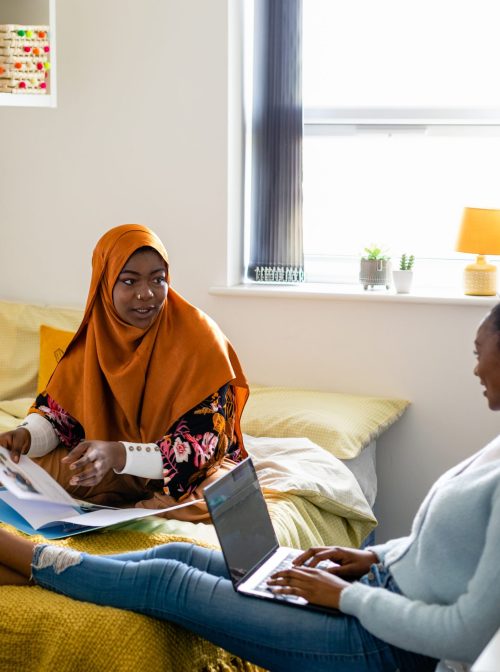In 2020, at the start of the pandemic, many college students went back to their family homes, if they were able to, and felt isolated from their college peers.
Hospital patients had limited visiting access to beloved family and friends. Chaplains could not visit many hospital patients and were only able to call in and speak with people on the phone, rather than offer an in-person spiritual care visit.
When I was a chaplain at Vassar College and Bard College in New York, the epicenter of the pandemic, I had limited access to seeing students. When I did see them, I heard stories about isolation and grief. Such feelings were not limited to college students, but to humans globally. As many of us quarantined and masked up to protect ourselves and others, this also included more free time to ponder and reflect on the state of the world. It was during this time that MyMuslimChaplain, my chaplain consultation company was born.
As I did more research to learn about how to meet the needs of Muslims located at many places, I learned, for example, that although there are four thousand universities and colleges in the United States, only 150 of them have a Muslim chaplain on staff. Even though American Muslims are a growing demographic, especially represented amongst young people, the hiring of Muslim chaplains across educational institutions has not kept up pace with the growth of the American Muslim population.
This is a gap I am trying to fill with my consultancy company through consultation services, workshops, and presentations in-person and virtually for institutions of higher education, prisons, hospitals, and other places where there is a substantial Muslim population but unmet representation.
I did a recent consultation with Denison University in Granville, OH. The head chaplain had requested a virtual workshop initially for her staff and then interest grew to departments across the university, with 20 people joining. The presentation addressed how to provide halal meat with various dining options on campus, adequate prayer space, and single gender housing. We also discussed how to combat anti-black Muslim racism and Islamophobia in addition to how to be a welcoming campus for Muslim students especially during Ramadan, the thirty days of fasting, and the holidays of Eid al-Fitr and Eid al-Adha. We spoke about how mental health of Muslim students is something neglected, sometimes due to bias, ignorance, and Islamophobia and suggested many ways of how to alleviate that.
As we prepare for Ramadan, a holy month for Muslims around the world, I developed a Ramadan Readiness Guide as a part of MyMuslimChaplain consultancy, which includes guides for education and health institutions. A few things you can do on a university campus is to educate dining staff about religious holidays and ask them to make a few specific dishes to highlight the joy of this month, which helps Muslim students on campus feel represented and celebrated. You can also work with housing and resident assistants to create goody bags for Eid al-Fitr, the holiday following Ramadan. This sends a message to Muslim students on campus that their holiday is something to be recognized and celebrated after a month of fasting.
One hospital chaplain at Emory University Hospital in Atlanta, GA messaged me on the effectiveness of the Ramadan guide: “Thank you for again for the Ramadan Readiness Guide. I reached out to some hospital leadership to see if we could plan something. I met with three Muslim staff members, two of whom are physicians, and they are very eager and excited to help plan an iftar (meal to break the fast) at the hospital. I’m so excited to support them, so thank you for me get the ball rolling here.”
With Ramadan having started on March 23, there are still ways to joyfully support Muslim students on campus this month and all year long. Having adequate religious and spiritual support is crucial for Muslim students. Lori Peek, a sociologist, conducted research on spiritual identity development of students in college and found most students saw the start of college to be important for identity, that their increased religiosity occurred from new friends and peer groups. Peek contends that for participants in her study, “peers and close friends played a significant role in constructing, reinforcing and affirming the strong emerging religious identity of almost all participants.” Additionally, participation with Muslim Students Associations facilitated the religious development of these students and their friends with shared similar values. Yet only 3.75% of U.S. colleges and universities have a Muslim chaplain. This is a critical gap, and something that I hope these institutions fill as an essential need for their campuses.
Nora Zaki Mantas is the interfaith chaplain at Dominican University in River Forest, IL, and the founder of MyMuslimChaplain.com, a consulting company which offers services to institutions of higher education, prisons, hospitals, and other places where Muslims are a substantial population but lack needed representation. She has a Master of Divinity from the University of Chicago and is pursuing an MA in Islamic Theology from Bayan Islamic Graduate School, based in Chicago Theological Seminary. Nora has studied the Islamic sciences and the Arabic language in Morocco, Egypt, and Jordan.
Find can learn more about her work at www.mymuslimchaplain.com or follow her on Instagram @mymuslimchaplain.




